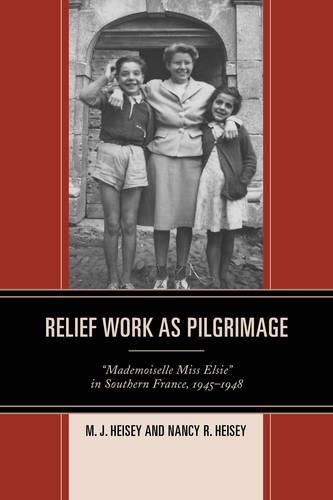
Relief Work as Pilgrimage: Mademoiselle Miss Elsie in Southern France, 19451948
(Hardback)
Publishing Details
Relief Work as Pilgrimage: Mademoiselle Miss Elsie in Southern France, 19451948
By (Author) M.J. Heisey
By (author) Nancy Heisey
Bloomsbury Publishing PLC
Lexington Books
20th August 2015
United States
Classifications
Professional and Scholarly
Non Fiction
Christianity
Religious mission and Religious Conversion
Other Nonconformist and Evangelical Churches
266.97092
Physical Properties
Hardback
208
Width 161mm, Height 236mm, Spine 22mm
449g
Description
In 1945, Elsie C. Bechtel left her Ohio home for the tiny French commune of Lavercantire, where for nearly three years she cared for children displaced by the ravages of war. Bechtels diary, photographs, and letters home to her family provide the central texts of this study. From 1945 to 1948, she recorded her encounters with French society and her immersion in the spare beauty of rural France. From her daily work came passionate musings on the emotional world of human interactions and evocative observations of the American, Spanish, and French co-workers and children with whom she lived. As a volunteer with the Mennonite Central Committee (MCC), Bechtel was part of the war relief efforts of pacifist Quakers and Anabaptists. In France between 1939 and 1948, MCC programs distributed clothing, shared food, and sheltered refugee children. The work began in the far southwest of France but, by the time Bechtel completed her service in 1948, had moved to the Alsace region, where French Mennonites clustered. Bechtels writings emerged from a religious context that included much travel, but little reflection on the significance of that travel. Yet, religiously motivated travelan old tradition in southwest Franceshaped Bechtels life. The authors consider her experiences in terms of religious pilgrimage and reflect on their own pilgrimage to Lavercantire in 2006 for a reunion with some of the people marked by the broader effort that Bechtel joined. To understand Bechtels experiences and prose, the authors examined archival sources on MCCs work in France, gathered oral and written narratives of participants, and researched other war relief efforts in Spain and France in the 1930s and 1940s. Drawing on these various contexts, the authors establish the complexity, but also the significance, of pilgrimage and humanitarian service as intercultural exchanges.
Reviews
From the time I began reading until I reached the end, I was mesmerized by this sacred journey back in time through the eyes of Elsie Bechtel. Equally impressive is the gaze of M. J. and Nancy Heisey on Miss Elsie's writings and the time period in which she lived and worked. Their care for Elsie and for the history in this space and time is palpable. -- Violet Dutcher, Eastern Mennonite University
Combined with her letters and photographs home, the Heiseys' extensive scholarship offers readers a rare glimpse into daily realities of an American womans experience as a relief worker. What emerges is a very human, well-rounded portrait of the inner life of a volunteer. We sense Elsie finds strength to overcome hardships through the heritage of her genuine faith, her determined efforts to learn French, and growing friendships with a few of her co-workers who share a common mission nurturing troubled children. Relief Work as Pilgrimage left me with the desire to have met and known this remarkable, adventuresome woman! -- Linda L. Hunt, Co-founder of the Krista Foundation for Global Citizenship
Author Bio
M. J. Heisey is associate professor of history at the State University of New York at Potsdam. Nancy R. Heisey is professor of biblical studies and church history at Eastern Mennonite University.
